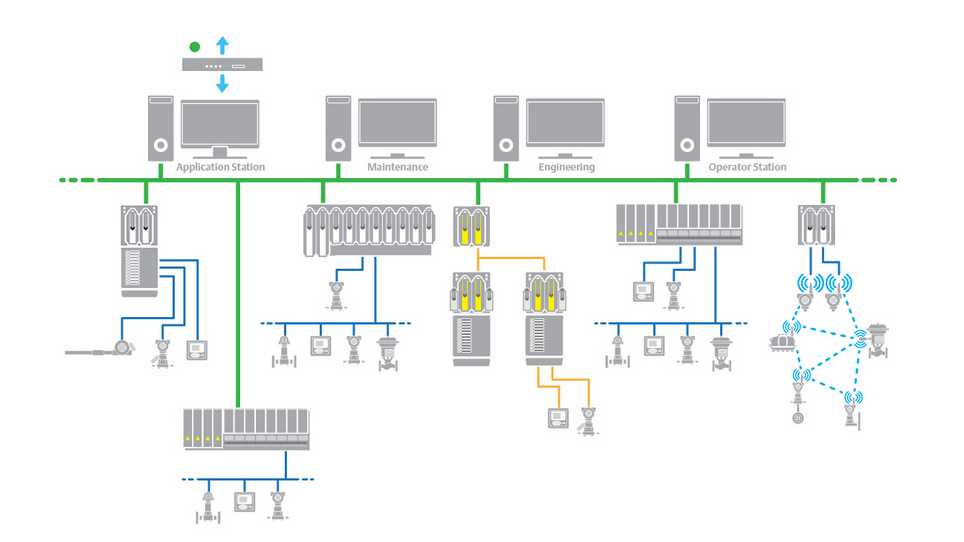What is the difference between Programmable Logic Controllers (PLC) training and Distributed Control System (DCS) training? 30 years back DCS was mainly used for operating Large Chemical Plants and Refineries and PLCs were historically used for controlling small units such as a compressor or a turbine. With the technological developments in the computer technology over the last three decades, the true difference between DCS and PLC has come down drastically, however, major DCS vendors still selling their products to large chemicals industries due to their extensive features. If a student wants to become an automation engineer, he/she can start with PLC or DCS, but soon they will have to know both. However, the first job anyone interested in makes a lot of difference in this choice. Even when you learn DCS, which DCS expertise that is most needed is a tough question. Have a discussion with our career councillor (free of cost) to decide which path you need to take. The following information covers the details of our DCS training for Emerson DeltaV Training.
In this course, you will learn to architecture and program DeltaV using various programming tools. If you have any familiarity with DeltaV already, this training course will help you enhance your knowledge. We will help you structure your training based on what you know and what you want to know. By the end of this training, a student can spec-out the system for a new plant/manufacturing facility, complete network architecture, install programs on a new system, program the logic based on the functional narrative of the process, complete functional tests, create Human Machine Interface (HMI), verify the communications with the peripheral systems using advanced communication protocols (Modbus, OPC) commission the DCS in a test system, and will learn how to hand-over the final system to operations.
In this training, you will also learn a part of what an Instrument Engineer must know to be a control engineer. As a control engineer, you will interact with electrical engineers, instrument technicians, and process engineers. This training will train you to interact with them intelligently and professionally.
If you already do not know, this training will include basics of electrical and electronics engineering, electrical safety, wiring fundamentals, control science, and instrumentation.
COURSE OBJECTIVES
The following are the example modules covered in this training.
- DCS function in Chemical, Petrochemical and Refineries
- DCS main components
- DCS architecture
- Control loop fundamentals and PID block
- Integrated Self-sufficient Controllers (Analogue loop)
- Modern Digital Control Loops (advanced PIDs)
- DCS Electrical fundamentals – Power Requirements
- UPS Systems for Controllers
- How to choose DCS vs PLC
- Emerson DeltaV DCS / SIS overview
- Emerson DeltaV DCS / SIS hardware components
- Emerson DeltaV DCS / SIS functional blocks
- Emerson DeltaV DCS / SIS network interfaces
- Emerson DeltaV DCS / SIS alarm management system
- DCS Loop Drawing, typical examples
- GA/IA Cabinet typical layout
- Emerson DeltaV DCS / SIS cabinet architecture
TRAINING METHODOLOGY
Infercon Distributed Control System (DCS) training program includes following training modes:
- Classroom and Virtual Lectures
- Advanced Topics: Seminars and Presentations
- Technical Group Discussions
- Class Assignments
- Industrial Case Studies and Functional Training Exercises
We train our students on “downloading” to the real DCS from the first class so that they can get a practical feel of their understanding throughout the course.
ORGANISATIONAL BENEFITS
Employees of industries who attends the DCS training at Infercon benefit in the following ways.
- Understand the specific DCS of their plant, which is the backbone of their operations, and contribute immediately after the training to improve productivity, efficiency, and reliability.
- Be part of the steering committee that decides upgrades and expansion of the DCS.
- Train other personnel who could not attend the training.
- Participate in new projects that need expertise in specifying the requirements, participate in vendor meetings, decide between multiple proposals on DCS from different vendors, help in automation project commissioning.
PERSONAL BENEFITS
For individuals, we aim this training to be a life-changing step.
- Understand the principle of operation of a range of sensors and transducers used in the Distributed Control System (DCS)
- Review the construction and operation of the most important Distributed Control System (DCS)
- Evaluate and select the most appropriate sensor technology for a given Distributed Control System (DCS)
- Design, build and test using a given specification of Distributed Control System (DCS)
- Identity components and features of a Distributed Control System (DCS)
- Optimise control by using relevant software of Distributed Control System (DCS)
WHO SHOULD ATTEND?
Distributed Control System (DCS) training course would be suitable for:
- Entry level Service engineers and experienced technicians in charge of operation and maintenance of instruments & control system
- Any engineer interested in starting a career in automation
- Engineers and electricians who want understand how the automation work for the sake of extending their knowledge
- Mechanical and electrical graduates who want to understand PLC/DCS interfacing with external world
- Computer science and computer system engineers who deal with real-time systems.
- Instrument and Process Control Technicians
- Maintenance Engineers
- Mechanical Engineers and Technicians
- Process or Manufacturing Operations Engineers
- Process or Manufacturing Technicians
- Production and Operations Manager Professionals
- Engineers working in System Integration companies
- Anyone who wants to understand how modern factories are automated, networked, and interfaced
- Fresh Graduates with few years of experience in automation, control system, instrument or process control engineers


